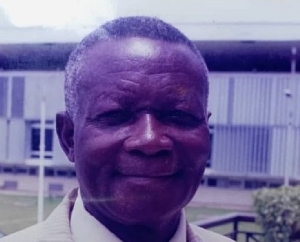Opinions of Wednesday, 25 November 2009
Columnist: GNA
Cry, Beloved Africa Cry
A GNA Feature by Esi Barko
Accra, Nov. 25, GNA - The African Continent, which is the richest and the second largest of the world, is perceived perhaps to be the most worried region on the planet.
Economic, political and environmental improvements are all at risk on the Continent due to the numerous conflicts that have plagued it. Despite its wealth in terms of both human and natural resources, extreme poverty and hunger abound in the Region.
Displaced people; poor food production due to competition over land and resources; growing inequality among the masses and communities; increasing crime rate and corruption are some of the many problems that have engulfed this rich Continent of ours.
In Liberia, Angola and Sierra Leone, the control and exploitation of diamond, timber and oil were some of the reasons that led to protracted wars in these countries. Control over these resources financed the various factions that gave them the means to continuously sustain the conflict. Many deaths were recorded whiles thousands of women and girls were raped with a lot more people having their limbs chopped off; a trend in other conflicts on the Continent.
In the Darfur Region of Sudan, over one million people are internally displaced while 200,000 have been forced to flee to other countries as refugees when the Janjaweed militia decided to attack their fellow black Africans over there. The death toll is unimaginable.
President Al Bashir of Sudan has been accused of complicity in the Janjaweed attacks. A charge he has always dismissed.
It always baffles the mind of young intellectual Africans when they have to read and watch Africans decimating each other especially over petty issues. In 1997, Eritrea and its neighbour Ethiopia embarked on the journey one would call 'exchange of bullets' when the former decided to embark on a journey of self determination.
Italy, the Colonial Masters of Abyssinia, the former name of the land where the two occupy, left in a hurry in 1952 leaving the vast field open for all sort of political poaching. Ethiopia dominated the affairs of that little territory called Eritrea to the dislike of its occupants. This had to be settled in a referendum held in 1993 in which 99.8 per cent of the voters voted in favour of independence without clearly defined borders. This resulted in thousands of death and millions of dollars meant for developmental projects channelled into the purchase of weapons by both sides. There were outbreaks of diseases such as diarrhoea; pneumonia; malnutrition and pre-industrial disease. That conflict was declared the most deadly since World War II.
Sometimes, one would be forced to accept the fact that some African folks hate stability and would go to every length to ensure that a stable and well planted government was over thrown due to their own parochial interests.
How often do African Leaders sacrifice the interest of many on the altar of selfishness; greed and nepotism? If African would only learn to respect the majority decision and the rule of law, this rich Continent of ours would go a long way to become one of the most well developed Continents because it abounds in natural resources.
It is sad to note that most African Leaders allow themselves to be manipulated by external forces especially, the West to achieve their selfish interests and desires.
The United States supported Mobutu Sese Seko to overthrow Patrice Lumumba, the Prime Minister of Congo (Democratic Republic of Congo). Mobutu metamorphosed into a dictator. Power was concentrated in Mobutu, who, backed by Western intelligence agencies became the foothold of US in the Region to counter the activities in neighbouring countries including Angola. He established a one-party state and a cult of personality. He suppressed tribal conflicts and encouraged a sense of nationhood, but at the same time amassed a huge personal fortune through economic exploitation and corruption, leading some to call his rule "kleptocracy." The nation suffered from uncontrolled inflation, a large debt, and massive currency devaluations. By 1991 economic deterioration and unrest led him to agree to share power with opposition leaders, but he used the army to thwart change until May, 1997, when rebel forces led by Laurent Kabila expelled him from the country. Mobutu died in Morocco.
It is believed that the 1960s, United States supported Mobutu Sese Seko, then a non-commissioned officer, to ruin the reign of Patrice Lumumba, the then Prime Minister of Congo (Democratic Republic of Congo). Kabila came to power in 1997 after the overthrow of Mobutu with the assistance of Angola, Eritrea and Uganda. Elements in the Congolese army who were also not happy about the rule of Kabila also assassinated him in 2001 and he was succeeded by his son Joseph Kabila at the tender age of 28. For years D.R. Congo never knew peace due to the unbridled competition to get access to exploit the rich mineral resources of that country. The beneficiaries were the top and the most powerful people in that country and some multinational companies.
The good news is that somewhere in West Africa, a government has decided to be pro-active. The Nigerian Government's decision to give 10 per cent of oil revenue to the people of Niger Delta for development projects is very laudable. The people of the Niger delta deserve it and even better. This should give the Movement for the Emancipation of the Niger Delta (MEND), the militia championing the cause of the Niger Delta, a reason to lay down their arms.
The Niger Delta, which produces the bulk of Nigerian oil has now became synonymous with conflicts, militarism, pollution and all the evil that one can think of.
Oil production in this Region is carried out by Mobil, Shell, Chevron, Elf and the rest. The moral question is; why are these big time oil producing companies not willing to use a little of their profits generated from the drilling of oil to better the lives of these people whose lives are at risk due to their very activities?
None would doubt that the people in that area deserve better. They have suffered enough indignation. Conditions in those areas are so deplorable and life threatening due to oil spillages. The murder of Ken Saro Wiwa, Writer and Activist, by the dictatorial Abacha Regime in 1998 is now a huge scar on the conscience and image of Nigeria.
Africa is for all Africans and it behooves all the people of the Continent especially, the Leaders to eschew those negative tendencies that do not make for a better Continent. They should learn to become more dedicated to the cause of the people and eschew greed, nepotism, corruption and conflicts that they have allowed to become the characteristic the Continent.
Africa needs re-branding in order to take its proper place on the world stage. Its Leaders must learn to let the interest of the people come first in all their undertakings. 25 Nov. 09












